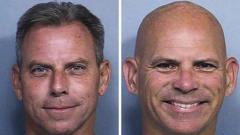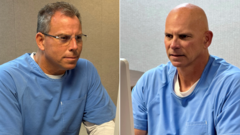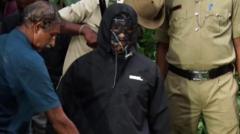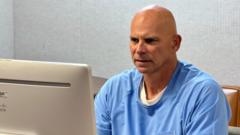In a landmark decision, a Los Angeles judge has reduced the sentences of Erik and Lyle Menendez—convicted of murdering their parents in 1989—granting them a pathway to parole. Judge Michael Jesic replaced their life sentences with 50 years to life, pending a parole board evaluation next month. The brothers contend their actions were driven by years of abuse, while the prosecution argues they remain unrepentant. This case, revived in popular culture, has rekindled a national debate over justice, rehabilitation, and the legacy of familial violence.
Judge Approves Parole Eligibility for Menendez Brothers After Lifelong Prison Sentences

Judge Approves Parole Eligibility for Menendez Brothers After Lifelong Prison Sentences
A pivotal ruling in the Menendez brothers' ongoing saga offers hope for parole eligibility after decades behind bars.
The courtroom witnessed an emotional plea when Judge Jesic announced the resentencing of Erik and Lyle Menendez, who were initially sentenced to life in prison without the possibility of parole for the brutal killings of their parents, Kitty and Jose Menendez, at their Beverly Hills home. The new sentencing of 50 years to life allows the brothers the opportunity for parole, a decision that must now be assessed by the state's parole board in a forthcoming hearing.
The Menendez brothers, who were ages 18 and 21 at the time of the murders, have long maintained that they acted in self-defense after enduring years of severe abuse. Throughout the decades of imprisonment, they have participated in various rehabilitation programs, which have now been highlighted during the resentencing. Witnesses, including family members and fellow inmates, spoke favorably about the positive changes the brothers have made while incarcerated, citing their involvement in educational initiatives and efforts to assist other prisoners.
After the judge's ruling, an emotional Erik Menendez apologized for the impact of their actions on their family, emphasizing the harrowing thoughts he had about their parents' final moments. His brother, Lyle, echoed this sentiment, revealing the regret he felt for putting their family through public scrutiny and shame. The district attorney's office opposed the resentencing, arguing that the brothers have not shown true remorse or accountability for their crimes.
District Attorney Nathan Hochman described the judge’s decision as "monumental" and cautioned that it brought significant implications for the victims’ families. Meanwhile, a defense attorney heralded the ruling as a crucial step toward reuniting the brothers with their loved ones, promising support from family members who have expressed hope for their rehabilitation.
Anticipation now builds as the brothers prepare for their parole hearing, where the state’s parole board will evaluate their risk assessment, scrutiny of their past behavior, and overall accountability for their crimes. Governor Gavin Newsom's involvement in reviewing clemency requests and his subsequent endorsement of the resentencing has added another layer to this complex legal saga. Although the brothers' narratives have garnered public sympathy—especially following a resurgence of interest spurred by recent media portrayals—many remain divided on the question of their release from incarceration.
As they await the parole board’s decision, the Menendez brothers’ future hangs in the balance, emblematic of the challenging intersection between crime, punishment, and rehabilitation in contemporary society.
The Menendez brothers, who were ages 18 and 21 at the time of the murders, have long maintained that they acted in self-defense after enduring years of severe abuse. Throughout the decades of imprisonment, they have participated in various rehabilitation programs, which have now been highlighted during the resentencing. Witnesses, including family members and fellow inmates, spoke favorably about the positive changes the brothers have made while incarcerated, citing their involvement in educational initiatives and efforts to assist other prisoners.
After the judge's ruling, an emotional Erik Menendez apologized for the impact of their actions on their family, emphasizing the harrowing thoughts he had about their parents' final moments. His brother, Lyle, echoed this sentiment, revealing the regret he felt for putting their family through public scrutiny and shame. The district attorney's office opposed the resentencing, arguing that the brothers have not shown true remorse or accountability for their crimes.
District Attorney Nathan Hochman described the judge’s decision as "monumental" and cautioned that it brought significant implications for the victims’ families. Meanwhile, a defense attorney heralded the ruling as a crucial step toward reuniting the brothers with their loved ones, promising support from family members who have expressed hope for their rehabilitation.
Anticipation now builds as the brothers prepare for their parole hearing, where the state’s parole board will evaluate their risk assessment, scrutiny of their past behavior, and overall accountability for their crimes. Governor Gavin Newsom's involvement in reviewing clemency requests and his subsequent endorsement of the resentencing has added another layer to this complex legal saga. Although the brothers' narratives have garnered public sympathy—especially following a resurgence of interest spurred by recent media portrayals—many remain divided on the question of their release from incarceration.
As they await the parole board’s decision, the Menendez brothers’ future hangs in the balance, emblematic of the challenging intersection between crime, punishment, and rehabilitation in contemporary society.


















